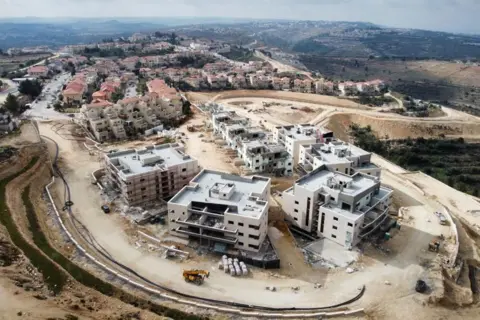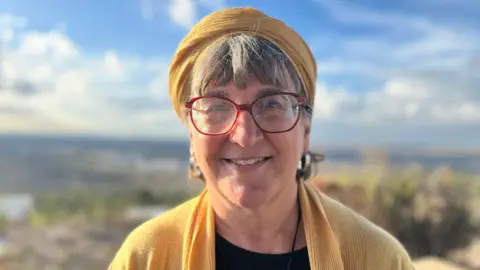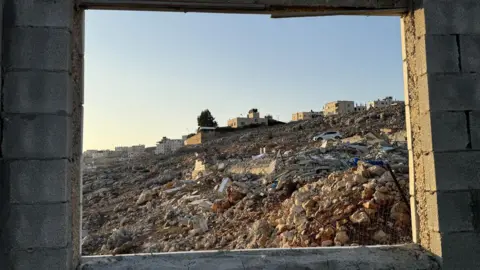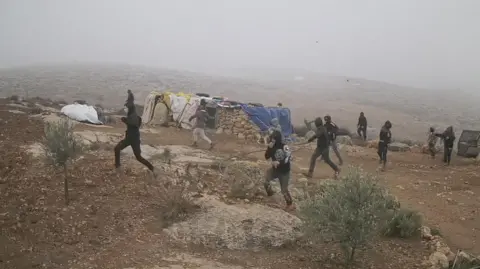 EPA
EPAOn a clear day, Tel Aviv's skyscrapers are visible from the hills above Karnei Shomron, an Israeli settlement in the occupied West Bank.
“I feel different from Tel Aviv,” said Sandra Baras, who has lived in Karnei Shomron for nearly 40 years. “I'm living in a place where my ancestors lived thousands of years ago. I don't live in the occupied territories; I live in biblical Judea and Samaria.”
For many settlers here, the line between the state of Israel and the territory captured from Jordan in the 1967 Middle East war has been erased from their narrative.
Visitors' audio-guides at hilltop viewpoints describe the West Bank as “a territory of Israel” and the Palestinian city of Nablus as the place where God promised to give land to the Jews.
But formal annexation of the territory has so far remained a dream for settlers like Sondra, even as the settlements – seen as illegal by the UN's top court and other countries – have grown over the years.
With the election of Donald Trump as the next President of the United States, many are now seeing an opportunity to go even further.
“I'm thrilled that Trump won,” Sondra told me. “I would very much like to extend sovereignty to Judea and Samaria. And I think that's something that Trump can support.”

There are signs that some in his incoming administration may agree with him.
Trump's new ambassador to Israel, Mike Huckabee, signaled his support for Israel's claims to the West Bank in an interview last year.
“When people use the word 'occupy,' I say: 'Yes, Israel is occupying land, but it is occupying a land that God gave them 3,500 years ago. This is their land,'” he said.
 Reuters
ReutersIsrael Gantz, the head of the Regional Settlements Council, which oversees the Karnei Shomron, said he had already noticed a change in tone from the incoming Trump administration following the October 7, 2023 attack by Hamas on Israel, which triggered the war in Gaza.
“Both here in Israel and the United States, they understand that we have to exercise sovereignty here,” he told me. “It's a process. I can't tell you it will happen tomorrow. But in my eyes, the dream of a two-state solution is dead.”
US President Joe Biden has always maintained the US position in support of Israel as well as a future Palestinian state. Asked if he was hearing anything different from the incoming Trump administration, Mr. Gantz replied, “Absolutely, yes.”
But there are also signs that Israelis lobbying to annex the West Bank — some of them in cabinet positions — may be disappointed by Trump's decision.
Their hopes are fueled by memories of his first term as president, during which he overturned decades of US policy – and international consensus – by recognizing Jerusalem as Israel's capital and severing Israeli sovereignty over the Golan Heights, captured from Syria. 1967.
 EPA
EPABut supporting the annexation of the West Bank would be too big and thorny for Trump.
That would likely alienate Saudi Arabia, Washington's other key ally, complicating Trump's prospects for a broader regional deal.
It could also alienate some moderate Republicans in the US Congress, concerned about the impact on Palestinians in the West Bank and their future status under Israeli rule.
Settler leader Sondra Baras told me that West Bank Palestinians who don't want to live in Israel “can go wherever they want”.
Challenging them on why they had to leave the motherland, he said: “I am not driving them away, but the situation is changing. How many wars did they start? And they lost.”
“If sovereignty were to go ahead, there would be a lot of shouting and screaming, absolutely,” he continued. “But at some point, you create a truth that is irreversible.”
Shortly after Trump's election victory last November, Israel's far-right Finance Minister Bezalel Smotrich publicly called for the annexation of Israeli settlements in the West Bank.
“2025 will definitely be the year of Judea and Samaria's sovereignty,” he said.

Whether the new US president agrees or not, many Palestinians say the formal annexation talks miss the point — that Israel is, in fact, already annexing territory here.
One of them is Mohaib Salameh. He led me over the ruins of his family home, built on private Palestinian land on the outskirts of Nablus. Last year an Israeli court declared the building illegal and it was demolished.
Israel has full control over the security and planning of 60% of the West Bank on an interim basis, as outlined in the Oslo Peace Accords three decades ago.
While settlements are expanding, permits for Palestinian homes are almost never granted. And lawyers say that vandalism is increasing.

“It's part of the policy to force us to leave,” Mohaib said. “It's a policy of forced immigration. That's what differentiates them [Israelis] If I build here or not? We pose no threat to them.”
Palestinians are also increasingly being forced off their land by violent Israeli settlers – who have been sanctioned by the US and UK, but mostly unchallenged by Israeli courts.
 B'Tselem
B'TselemActivists say more than 20 Palestinian communities in the West Bank have been driven out by increasingly violent attacks in the past few years, and settlers are now entering new areas outside Israel's interim civilian control.
Mohaib told me that no US president has ever defended the Palestinians, and he doesn't believe Donald Trump will either.
America's next president is widely seen as a friend of Israel.
But he's also a man who likes to close deals — and avoid conflict.
